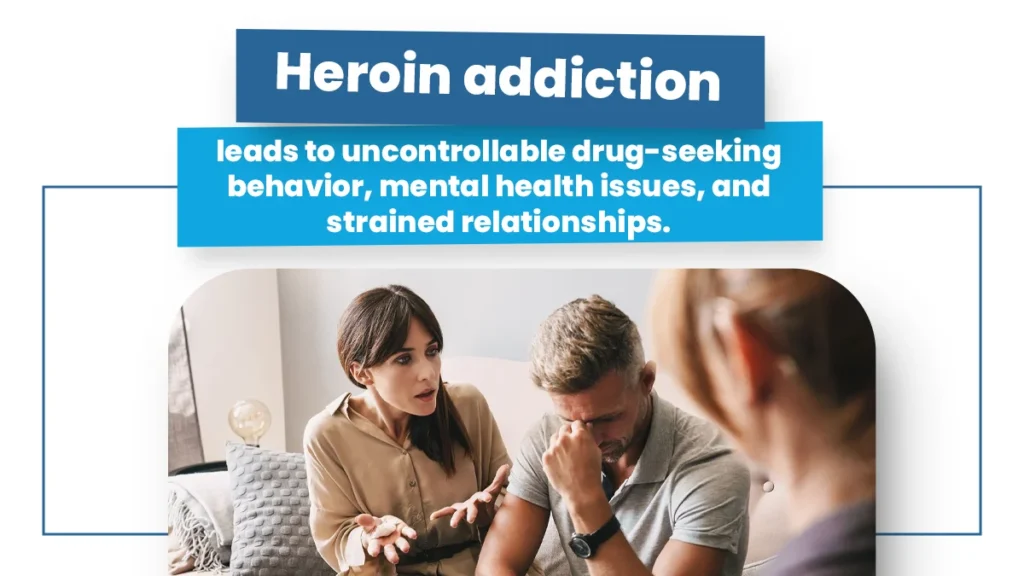If you’ve ever wondered about the effects of heroin, you’re not alone. Heroin is a powerful drug that can have a profound impact on those who use it. Here, we will explore what heroin does to your body and mind. From its immediate effects to the long-term consequences, we’ll break down the science behind this drug.
So, let’s dive in and discover the real story behind heroin and its impact on you.
Key Takeaways
Heroin binds to opioid receptors, causing euphoria, but its effects include slowed heart rate, breathing difficulty, and drowsiness. Here’s what you need to know:
- Heroin users experience a quick pleasure “rush,” followed by a drop in blood pressure, nausea, and slowed heart rate.
- Chronic heroin use results in physical changes, intense cravings, and health risks like hepatitis C, impacting overall well-being.
- Heroin addiction leads to uncontrollable drug-seeking behavior, mental health issues, and strained relationships.
- Heroin affects various body systems—central nervous, respiratory, digestive, and cardiovascular—leading to dangerous consequences.
Rediscover a life free from addiction—find solace and support at The Haven Detox-New England, your partner in the journey to a brighter, healthier tomorrow. Call us at (844) 933-4145 today and learn more about our admission process.
Heroin: Explained
Heroin is a substance that binds to opioid receptors in the brain, leading to a feeling of euphoria. However, it’s essential to know the not-so-good side, too.
Short-term effects of heroin use include:
- A slowed heart rate
- Difficulty breathing.
- Drowsiness
Long-term effects of heroin drug abuse can lead to:
- Permanent brain damage
- Cognitive impairment
- Harm to organs
Moreover, heroin is a dangerous substance with significant short and long-term effects. But with the right information, treatment, and support, individuals can break free from their grip and regain their lives.
Immediate Impact on the Body

Heroin is a powerful drug, twice as potent as morphine. Users feel a “rush” of pleasure, but it’s short-lived. Within hours, their body’s blood pressure drops, and they may become nauseous. This drug is a central nervous system depressant, slowing down a person’s breathing and heart rate. Painkillers like heroin can be especially dangerous for teens.
Heroin users often inject the drug using needles, putting them at risk for infectious diseases. When the high wears off, heroin withdrawal symptoms kick in, making users crave more.
If you or a loved one is struggling with heroin, it’s crucial to seek help from professionals and consider medications like naloxone nasal sprays. Remember, there’s hope and support available for recovery.
Physical Toll of Chronic Heroin Use
Chronic drug use takes a heavy toll on the body. When people use heroin for a long time, their health faces serious risks. Hair follicles change, and they may experience muscle pain. Using heroin can also lead to hepatitis C, an infectious disease.
Chronic heroin use affects the brain and body. It causes intense cravings for the drug, making it hard to quit. Changes in the brain’s function due to heroin addiction play a significant role in this process.
It’s important to note that chronic heroin use affects the body’s overall function and well-being. Seeking medical help and considering medications like methadone can assist in the recovery journey. Remember, there’s hope for those battling heroin addiction.
Psychological Impact of Heroin
Chronic heroin use doesn’t just harm the body; it takes a toll on the mind, too. Regular use of heroin can lead to uncontrollable drug-seeking behaviors. The brain’s chemistry changes, making the person need higher doses to feel the same effects.
Heroin addiction can cause feelings of hopelessness, sadness, and anxiety. These are severe problems that require medical help and treatment programs to overcome.
People who take heroin might start to prioritize the drug over friends, family, and work, causing strained relationships. It’s crucial to reach out to local resources for support and recovery.
Furthermore, heroin doesn’t just affect the body; it deeply impacts the way a person thinks and behaves. Seeking help and treatment is essential to overcome the psychological grip of this highly addictive drug.
How Heroin Interacts with Different Body Systems
Heroin’s impact on our body systems is significant. Let’s explore how it affects different systems, keeping it simple for easy understanding.
Central Nervous System
Heroin acts as a depressant in the central nervous system. It slows down brain function, causing drowsiness and confusion. Users often experience an intense “rush” followed by deep relaxation. Over time, this can lead to physical dependence, making the brain rely on the drug.
Respiratory System
Heroin slows down breathing, which can be dangerous, especially during overdose. It can even cause respiratory failure in some cases.
Digestive System
Heroin slows down the digestive system, causing constipation. Long-term use can lead to severe gastrointestinal issues.
Cardiovascular System
Heroin can cause a drop in blood pressure, leading to a weak pulse. It also puts strain on the heart and can lead to heart infections when injected.
Heroin’s effects on the central nervous system, respiratory system, digestive system, and cardiovascular system are significant and potentially dangerous. Understanding these interactions is crucial to tackling the challenges of heroin use and addiction.
Social Consequences of Heroin Use
Heroin use doesn’t just affect the person using it; it ripples through society, creating social problems. Heroin use can tear families apart. When a family member struggles with heroin, it’s distressing for everyone involved. It strains relationships and can lead to a breakdown in trust.
The burden on healthcare providers is substantial as they treat the physical and mental health problems that come with heroin use. Medical professionals work tirelessly to provide medical care and support to those affected.
Heroin use can lead to criminal activities as people seek money to buy the drug. It strains law enforcement and legal resources.
Heroin users might struggle to maintain employment, which impacts both individuals and their employers. Lost productivity affects workplaces and the economy.
Risk of Overdose
Heroin overdose is a grave concern. When someone takes too much heroin, their body struggles to handle it. The symptoms of an overdose include:
- slow breathing
- blue lips
- unconsciousness.
It’s essential to act fast and call for help, as an overdose can lead to death.
Using heroin with other substances like alcohol or benzodiazepines increases the risk of overdose. If you suspect an overdose, don’t wait – dial emergency services immediately. Understanding the dangers of overdose is crucial to keeping yourself and others safe when dealing with heroin.
Recovery from Heroin Addiction
Recovery from drug addiction is possible. It’s not easy, but it can be done. Here are some key points to keep in mind:
- Seek Help: Reach out to professionals, counselors, or support groups. They can provide guidance and emotional support.
- Treatment Programs: Consider enrolling in a treatment program. These programs offer a structured approach to recovery.
- Relapse: It’s okay if you stumble. Many people face setbacks on the road to recovery. The key is to keep trying.
- Healthy Lifestyle: Maintain a healthy lifestyle with exercise, a balanced diet, and enough sleep.
- Support System: Surround yourself with a positive and supportive network of friends and family.
Remember, recovery is a journey, and you’re not alone. Many have overcome heroin addiction and built better lives.
Frequently Asked Questions (FAQ)
How quickly can someone become addicted to heroin, and why?
Heroin addiction can develop quickly, often within weeks. This rapid onset is due to heroin’s powerful effects on the brain’s pleasure and reward systems. The intense high it provides can lead to physical and psychological dependence, making it challenging to quit without professional help and treatment.
Does heroin kill brain cells?
Heroin use disorder doesn’t directly kill brain cells, but it can damage them over time. Prolonged heroin use can lead to cognitive impairment, affecting memory, decision-making, and overall brain function. Seek help to prevent further harm and begin the path to recovery.
What is it really like to be addicted to heroin?
Being addicted to heroin is a harrowing experience. It consumes your life, leading to physical and psychological dependence. The daily struggle for the next high dominates your thoughts and actions, often leading to isolation, health issues, and a downward spiral that’s hard to escape without proper help and treatment.
Get the Support You Need at The Haven Detox-New England
Are you or a loved one trapped in the cycle of addiction? The Haven Detox-New England is your lifeline to recovery. Our dedicated team provides detox and residential treatment services, specializing in alcohol, benzodiazepine, and cocaine addiction.
We’re equipped to address dual diagnosis cases and offer guidance in verifying your insurance coverage. Don’t let addiction control your life any longer – take the first step towards healing with us.
Call us at (844) 933-4145 today for more information about our programs.
Verify Insurance
Let’s get you or a loved one help with a few simple steps.
-
Heroin Treatment
- Beyond Pleasure: The Addictive Nature of Heroin
- Exploring the Long-Term Effects of Heroin
- Heroin and Its Effects on the Body
- Heroin Withdrawal Timeline and Coping Strategies
- How to Detect a Heroin Overdose
- Identifying Symptoms of a Heroin Addiction
- Signs That Point to Heroin Use
- What Does Heroin Do? Understanding the Impact




